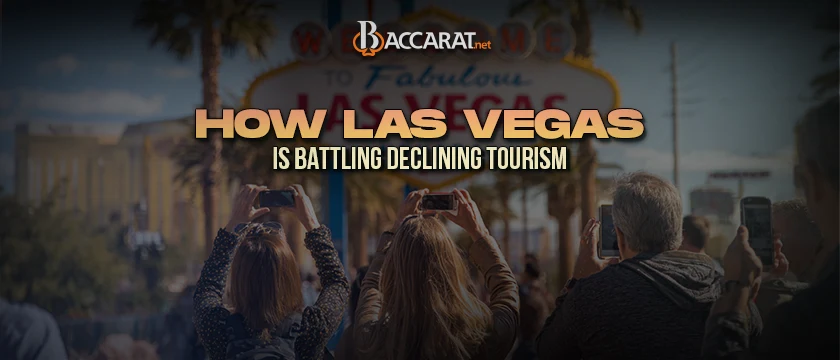How Las Vegas Is Responding to Declining Tourist Numbers

Las Vegas has long been a global icon for entertainment, gaming, and nightlife. However, in recent times, it has been facing competition from the rise in popularity of games such as online baccarat. Recent data shows a downturn in Las Vegas, with summer visitor numbers falling by double digits compared to last year. For a city that thrives on tourism-driven spending, this trend is both a challenge and a call to action.
Why Visitor Numbers Are Falling and What It Means
While Las Vegas always sees a dip in visitors during the hottest months, the summer of 2025 has been noticeably quieter than usual. June figures from the Las Vegas Convention and Visitors Authority (LVCVA) show that the number of visitors fell by more than 11% when compared to the same period last year. In real terms, this means hundreds of thousands fewer people exploring the Strip, checking into hotels, and eating in restaurants. Hotel occupancy, which normally hovers around the high 80s during summer, has fallen several percentage points, and Harry Reid International Airport recorded a 6% drop in passenger arrivals.
Several causes have combined to create this downturn. California, the city’s largest domestic market, has been hit hard by wildfires that disrupted travel plans. The absence of mega-events such as the Super Bowl and March Madness, which drove numbers in 2024, has left a gap in this year’s calendar. Rising prices have also been a factor. Many visitors now perceive Las Vegas as leaning heavily toward luxury offerings, with high resort fees, costly dining, and premium attractions making it harder to market the city as a value-driven getaway.
The impact goes far beyond visitor statistics. Tourism generated more than $55 billion in spending last year, and directly supported around 250,000 jobs in southern Nevada. When indirect and induced employment is factored in, over half of the region’s workforce depends on tourism in some form. Any prolonged downturn risks affecting not just part-time and hospitality staff, but also the wider economy that relies on the spending power of visitors.
How Las Vegas Is Fighting Back
Las Vegas has never been afraid of reinvention, and this summer has been no different. In an effort to reverse the slowdown, hotels and resorts are experimenting with strategies aimed at attracting both locals and tourists. One step has been addressing the long-standing frustration of resort fees. Properties such as Sahara and Resorts World have announced temporary waivers of fees that typically add $50 or more per night to a stay. These offers, while limited, send a clear message to cost-conscious travelers that Vegas is willing to adjust.
At the same time, several operators have targeted Nevada residents with discounts designed to stimulate local spending. Caesars, MGM, and Virgin Hotels have all rolled out packages offering reduced room rates, attraction passes, and dining credits for anyone with a state ID. This helps fill hotel rooms while reinforcing Las Vegas as a destination not just for international tourists but also for locals.
Downtown hotels, known for their lower price points compared to the Strip, have leaned heavily into all-inclusive packages. Offers bundling meals, entertainment, and waived fees are designed to provide visitors with a clearer sense of value and can encourage longer stays. These strategies also show how the city is increasingly segmenting its market, appealing to both high-end visitors and those seeking affordability.
The entertainment calendar remains one of Las Vegas’s most powerful tools. While the summer lacked headline events, the coming months look better. Raiders football, the Formula 1 race, and high-profile concert residencies are expected to boost arrivals. Sporting events, in particular, have become central to the city’s tourism strategy, with professional teams and fight nights drawing fans from across the country.
What the Future Holds for Las Vegas
Las Vegas is far from done, and industry experts remain cautiously optimistic. Convention bookings are solid, and they provide a buffer against softer leisure travel, and reservations for autumn 2025 point to an upturn. Analysts note that while the summer has been weak, Las Vegas continues to have a powerful draw as a destination for large-scale events, conferences, and entertainment that simply cannot be replicated elsewhere.
Longer term, the challenge will be balancing premium offerings with affordability. Part of Las Vegas’s historic appeal was the promise of value, cheap buffets, discounted rooms, and a sense of accessibility. As prices climb, operators risk alienating budget-conscious travelers. However, if promotions are positioned as limited-time incentives, they can drive demand without permanently damaging the city’s luxury brand.
Las Vegas has survived downturns before, from recessions to the pandemic, and each time the city has found ways to adapt. With targeted promotions, major sporting events, and continued investment in new attractions, Las Vegas is already laying the groundwork for recovery. Furthermore, if you are interested in playing baccarat in Las Vegas, this period may actually present one of the best times to do so, with fewer crowds, better deals, and the chance to see a city once again reinventing itself.



